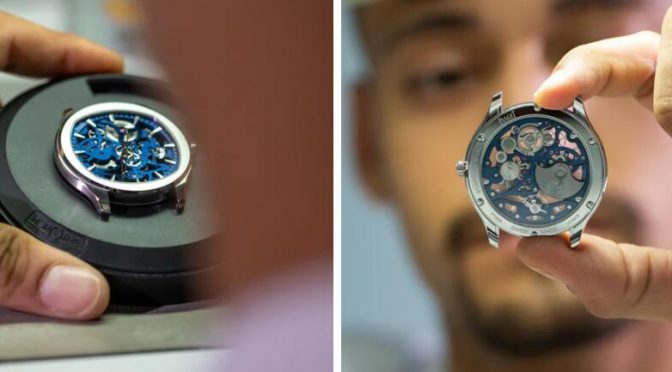
Introduced in 1979, the Piaget Polo was the epitome of go-go ’70s glamour and luxury. Solid gold and home to one of the most prestigious quartz movements of the era, the Piaget Polo redefined the category of sporty watches throughout the 1980s, and was worn by celebrities, dignitaries, and style icons alike. The Piaget Polo was bold, charmingly ostentatious, and in a class of its own.
With a fully integrated bracelet and unique aesthetic language, the Piaget Polo stood proudly on the brand’s ethos of over-the-top playfulness and creative design as it spoke to an audience of young, affluent customers looking for a watch they could wear to a black-tie gala or the poolside bash – all without worry.
With so many stunning avant-garde watches in their portfolio, the Piaget Polo was clearly designed to meet the demands of its time, which is no doubt why this daring watch saw so much success. Born amidst the rise of other now-iconic sports watch designs, the Piaget Polo was a sporty watch, yes, but the Piaget Polo somehow managed to simultaneously exist as a dress watch, giving it its own unique allure.
With ultra-thin movement development at the center of all that Piaget does, the brand quickly realized they could continue to reinvent contemporary watchmaking, playing with the dial, case, and movement to produce something entirely new. The Piaget Polo represented a coming together of both worlds of Piaget – on one hand, high watchmaking expertise, and on the other, jewelry and design expertise. Full integration of the bracelet, case, and dial led to the Piaget Polo’s iconic design language we still see today.
The Piaget Polo remained a part of Piaget’s collection and received several updates between the 1980s and mid-2000s, earning the fanfare of celebrities and influencers along the way.
In 2016, Piaget breathed new life into the Piaget Polo collection with the introduction of the Piaget Polo S. While “S” stood for the steel watch to be produced by Piaget, it also signaled the brand’s commitment to a new signature and style as it formally broke into the luxury steel sports watch segment. The Piaget Polo S aimed to accomplish as much as the Piaget Polo had done in the late 1970s and early ’80s, when it was the versatile watch of the jet-set crowd, admired for its precious looks and water resistance. The Piaget Polo was back.
Introducing the Replica Piaget Polo Skeleton
Today, Piaget’s evolution as a watchmaker is defined by dualities – glamorous and sporty, ultra-thin and ultra-complicated, traditional and innovative. It is within this context of juxtaposition that the Piaget Polo Skeleton is born.
The Piaget Polo collection has long served as a platform for Piaget’s tourbillons and chronographs, as well as a playground for exploring ultra-thin movement development. It was only a matter of time until skeletonization was introduced to the collection.
Since 1970, Piaget has approached skeletonization within the context of the art of engraving, striving to maintain the ethereal elegance of movement design alongside technical perfection. In this pursuit of perfection, ultra-thin remained central, and records for ultra-thin skeletonized movements continue to be broken to this day. Piaget was the first manufacturer to gem-set the functional components of a skeletonized movement, ensuring that the watch was as aesthetically beautiful as it was functional.
The Piaget Polo Skeleton is now thinner than ever thanks to the Piaget 1200S1 movement on full display within the contemporary case. Leaning into the brand’s ultrathin expertise, this new 2.4mm movement is magnificently thin. The movement is of course entirely skeletonized, including the hands, but also adorned with immaculate miniature works of art.
At 42mm, the Piaget Polo Skeleton is able to maintain its iconic shape, despite being in a now slimmer 6.5mm case. With a sapphire case back, the entire movement can be viewed from front to back. The Piaget Polo Skeleton redefines modern luxury. In combining a bold, sporty design with ultra-thin skeletonization, the Piaget Polo Skeleton provides a bold new sense of elegance.
“Our artisans today, our engineers today, our watchmakers today, not only do they innovate for any kind of project or for the sake of innovating or going beyond, but they also innovate to build our equity and further strengthen the DNA of Piaget.”
The Piaget Polo is what many consider to be the future of the brand. There is an ongoing conversation between innovation and tradition at Piaget – one that is not taken lightly by leadership. The Piaget Polo Skeleton is representative of a culmination of a legacy of patrimony built on ultra-thin, skeletonization, and design, and will undoubtedly become the foundation of the next iteration of the brand, creating this feedback loop that forever drives creativity. The Piaget Polo Skeleton is an expression of the times, just as the original Piaget Polo was in 1979.